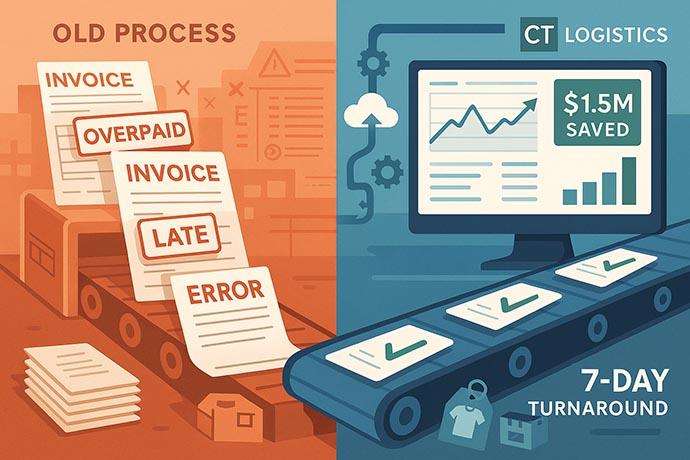
Case Study: Transitioning Freight Audit and Payment Services for a Global Medical Device Company
Client: A leading global medical device company in the healthcare industry.
Challenge:
The client previously used a regional freight audit & payment provider that struggled to handle the complexities of their global shipping operations. Issues included inconsistent audit accuracy, limited reporting capabilities, and lack of real-time visibility. They sought to transition to CT Logistics to streamline processes, enhance data accuracy, and achieve better cost control.
CT Logistics Solution:
- Assessment: CT Logistics conducted a comprehensive evaluation of the client’s freight audit workflows, identifying data bottlenecks and inconsistencies in invoicing.
- Seamless Transition Plan: Developed a phased migration strategy that ensured continuity of services, including running dual systems during the transition.
- Data Integration: Migrated historical freight data into CT Logistics’ system, ensuring complete audit trails and compliance.
- Custom Reporting: Designed tailored dashboards and reporting tools for real-time insights into freight costs and trends.
- Ongoing Support: Assigned a dedicated account team to monitor performance and provide post-transition assistance.
Results:
- 15% reduction in duplicate payments and billing errors.
- Enhanced visibility into freight spend across all global regions.
- Improved decision-making with customized analytics and cost-saving recommendations.
Case Study: Seamless Transition to CT Logistics for Freight Audit Services
Client: One of the largest global apparel companies.
Challenge:
Client faced frequent billing errors, limited reporting, and slow invoice processing with their previous freight audit provider, impacting cost control and efficiency.
CT Logistics Solution:
CT Logistics implemented a seamless transition plan, including:
- Conducting a historical audit to identify inefficiencies.
- Establishing EDI connections with carriers.
- Customizing their freight audit software to meet Client’s needs.
- Providing robust analytics and actionable insights post-implementation.
Results:
- 20% Accuracy Improvement: Reduced overpayments by $1.5M annually.
- 50% Faster Processing: Cut invoice processing time from 14 to 7 days.
- Enhanced Reporting: Identified cost-saving opportunities, saving an additional $750K.
Conclusion:
CT Logistics delivered tailored solutions, improving efficiency, accuracy, and cost management.
Case Study: A leading Manufacturer Optimizes Transportation Management with CT Logistics TMS
Client: A leading manufacturer with operations across all regions of North America faced challenges from managing a fragmented transportation process. With multiple carriers, modes, and regional systems, the client lacked visibility, consistency, and control over transportation execution and spend.
Challenge:
- Decentralized transportation management across regions
- Inconsistent carrier selection and rate application
- Limited visibility into multi-modal shipments
- Manual processes increasing operational costs
- Difficulty auditing and reconciling freight invoices
CT Logistics Solution:
CT Logistics implemented its enterprise-class Transportation Management System (TMS), integrating seamlessly with the client’s ERP and logistics partners. The implementation included:
- Multi-mode support for parcel, LTL, and TL
- Automated shipment execution and carrier selection
- Real-time visibility across regions and currencies
- Consolidated freight audit & payment processing
- Integration with business intelligence tools for spend analysis
- Configurable user access and workflow automation
Results:
Within 6 months of deployment, the client achieved:
- 12% reduction in freight costs through optimized carrier selection
- 30% increase in invoice accuracy via automated audit
- Improved compliance with shipping policies
Case Study: Strategic LTL Contract Optimization for Industrial Supply Leader
Client:
A major U.S.-based industrial supply company managing approximately 200,000 LTL (less-than-truckload) shipments annually across a nationwide distribution network and roughly $40 million in spend.
Challenge:
The client faced rising transportation costs and diminishing carrier performance consistency, particularly across high-volume regions. With LTL contracts nearing renewal, the company needed support in evaluating current carrier agreements, exploring alternative partners, and identifying immediate and long-term savings opportunities—without disrupting service quality.
CT Logistics Solution:
- Contract Review & Bid Strategy
We began by assessing the client's existing LTL contracts and identifying gaps in cost competitiveness and service alignment. A multi-round bid process was launched, incorporating both incumbent and potential new carriers. - Bid Analysis & Market Benchmarking
Detailed analysis was conducted on all bid responses to:- Assess pricing competitiveness against current market trends.
- Measure each carrier’s alignment with the client’s service needs and forecasted network growth.
- Highlight key areas where further rate concessions could be negotiated.
- Operational Fit & Regional Capacity Evaluation
Beyond cost, we analyzed operational capabilities—including regional service strengths, ramp-up potential, and customer-specific requirements. Special attention was paid to carrier performance in the highest-volume distribution zones to ensure consistent service levels. - Routing Guide Optimization
Based on the analysis, we partnered with the client to refine their existing routing guides. This ensured that the lowest-cost, highest-performing carriers were prioritized across different regions.
Results:
- Cost Savings: Achieved an overall savings of 6%, translating to $2.4M in annual transportation spend reductions.
- Ongoing Opportunity: With full implementation and carrier performance alignment, a stabilized incremental long-term savings of 2%–2.5% is expected.
- Improved Carrier Alignment: Enhanced carrier mix and routing guide structure now better reflect service needs by region while improving overall service reliability.
- Data-Driven Negotiation: Provided a clear, defensible framework for the client to negotiate effectively with carriers based on real market conditions.
Conclusion:
Through a blend of strategic sourcing, data-driven negotiation, and operational analysis, we empowered this large-scale industrial supplier to reduce LTL transportation costs significantly without sacrificing service performance—laying the groundwork for a more efficient and resilient distribution network.



